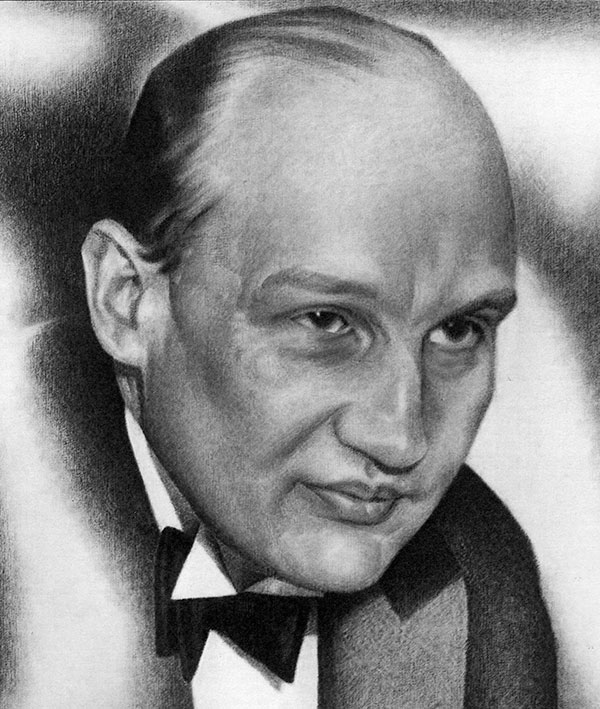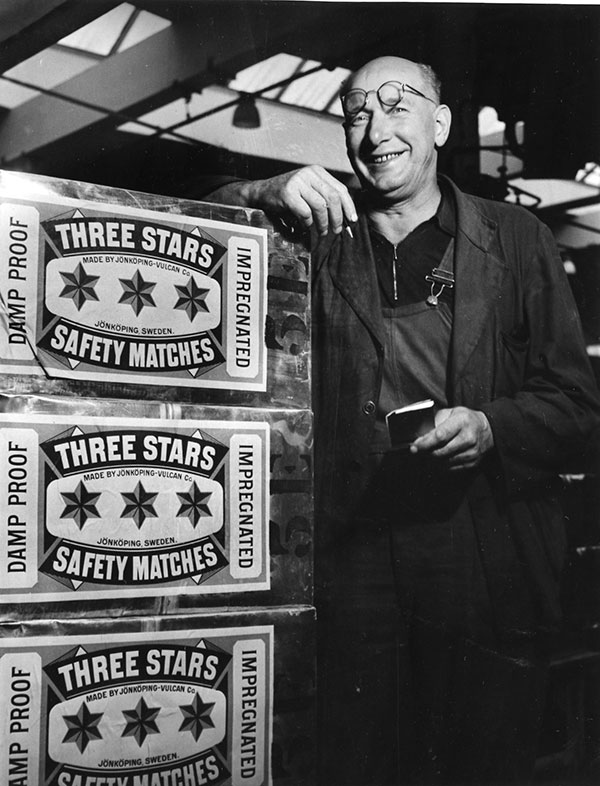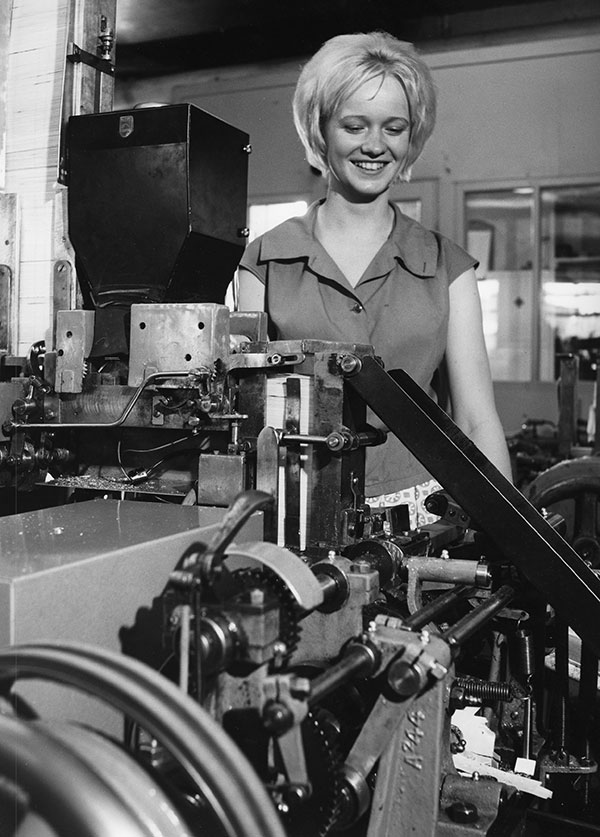Svenska Tändsticks AB
1917
Swedish Match industry restructured
As a result of severe competition prior to the First World War, the Swedish match industry was restructured from 20 to two companies. One of which, Aktiebolaget Förenade Tändsticksfabriker (Förenade), was led by Ivar Kreuger.

Established at Krueger’s initiative
Ivar Kreuger took the initiative for a merger between Förenade and Jönköpings & Vulcan Tändsticksfabriksaktiebolag.
In the autumn of 1917, Svenska Tändsticks Aktiebolaget was formed, with Ivar Kreuger as President. The new company was to function as the Parent Company with financial and control functions, while operations were conducted by Jönköping-Vulcan and Förenade.
1917-1932
Global expansion
After the merger, Svenska Tändskicks AB expanded strongly internationally. In 1918, the company was listed on the Stockholm Stock Exchange.
In 1930, Svenska Tändsticks AB was the sole or dominant owner of match companies in 33 countries, in addition to minority interests and agreements to restrict competition in a number of markets. Svenska Tändsticks AB controlled a total of 60 percent of the global production. Dominance of the global match industry was the clear objective, and the most common method of expanding the market was the acquisition of companies by buying shares.
Increase in borrowing
Up until 1923, capital for acquisitions was largely obtained by borrowing large sums in Sweden. Subsequently, the company began to issue shares to other countries, establishing itself primarily in the US capital market. The funds borrowed, mainly in the US, amounted to billions.
Match monopolies through government loans
Until 1927, expansion was primarily achieved in the form of acquisitions. However, this proved to be insufficient to eliminate competition. Instead, Ivar Kreuger tried to establish match monopolies in various countries, usually in combination with offers of loans to the governments of states with shaky economies. The main commitments were in Germany and Eastern Europe.
Kreuger’s fall
The cash-flow crisis in Svenska Tändsticks AB and the other Kreuger companies in 1931–1932 was partly a result of the world economic crisis after the Wall Street crash in October 1929.
Generally speaking, the company was in a healthy financial state in terms of the return on investments, but expansion had been too rapid, and the shareholders’ equity and liquid assets were inadequate. For many years, the expansion of the Kreuger Group had been funded by US sources, but the financial crisis cut off the flow of US capital to Europe in a single stroke.
Some companies declared bankrupt
Following the death of Kreuger in March 1932, doubts were expressed about the Group’s financial position, and it was feared that Kreuger had personally been involved in irregularities.
The Swedish Government passed a law granting a moratorium – a temporary suspension of payments – and appointed a special investigation commission. Some companies in the Group could not be saved and were declared bankrupt.
1932-1939
The head office was moved from Stockholm to Jönköping. The new President was Fred Ljungberg. Substantial interests in a number of plants all over the world were divested at a time when world trade was declining. The relatively free trade that existed before the First World War had been replaced by protectionism in the form of tariffs and import restrictions in many countries. In 1938, Svenska Tändsticks AB’s share of the global production of matches dropped to approximately 20 percent.
Changed ownership structure
Ownership of the company was very diverse. Following the bankruptcy of Kreuger & Toll and Ivar Kreuger’s estate, shares in Svenska Tändsticks AB changed ownership.
Very substantial blocks of shares were acquired by investment companies closely linked to Stockholms Enskilda Bank and the Wallenberg family. Investment companies in the Skandinaviska Banken sphere also made acquisitions and, as a result, were represented on the Board of Svenska Tändsticks AB.
1939-1945
During the war years, exports of Swedish matches declined, leading to the concentration of production to fewer plants. The company diversified into new product lines in order to maintain employment. A veneer plant was established at the match plant in Jönköping, a door plant was set up in Lidköping, and manufacturing of fiberboard started in Katrinefors.
Brandin new President
In 1944, Fred Ljungberg was succeeded by Axel Brandin as President. The Chairman of the Board was Jacob Wallenberg, President of Stockholms Enskilda Bank. Jacob Wallenberg remained as Chairman until 1973.
1950s
In the beginning of the 1950s the market drastically declined and the downward trend was unmistakable. Svenska Tändsticks AB decided look for new areas of activity and expansion into other industries.


1960s & 70s
Focus on the forest industry
Svenska Tändsticks AB decided to focus on the forest industry as its principal industrial line in parallel with match production. Priority was to be given to such product groups as paper, board, wallboard and chipboard. In 1965, the Åkerlund & Rausing packaging company was acquired.
Acquisitions of companies in diverse industries
Between 1968 and 1976, more than 50 companies were acquired. The Tarkett floor company was acquired in 1970, following which match products only accounted for 20 percent of sales.
The building materials division had overtaken the match division in terms of size. In addition to such building products as doors, windows, floors and board, the company had operations in the packaging and match-making machinery industries, and was also involved in manufacturing garbage trucks, equipment for waste combustion, tobacco-making machinery and equipment for bakeries, fish processing and bowling halls, etc. The German chipboard company, Kubel AG, was acquired in 1973.
New Chairman of the Board and President
Svenska Tändsticks AB’s head office was moved back to Stockholm in 1972. In the following year, Jacob Wallenberg was succeeded as Chairman of the Board by Ambassador Erik Boeheman, who remained until 1976, when he was replaced by Lars-Erik Thunholm. Rolf Deinoff was President from 1968 to 1977, when he was replaced by Gunnar Dahlsten.
Industrial group instead of holding company
When Gunnar Dahlsten became President and CEO in 1977, the company had major profitability problems. Dahlsten’s recipe was to state objectives in concrete business terms and to focus on operations with a clear mutual link. Svenska Tändsticks AB was to be an industrial Group, not a holding company in a conglomerate, with operations that were partially unrelated.
Improved earnings
When this restructuring was largely completed in 1982, the Group’s earnings were substantially improved.
1980s
Name change to Swedish Match
In 1980, Svenska Tändsticks AB changed its name to Swedish Match to achieve uniformity throughout the Group and to avoid various translations of its name.
More acquisitions
Disposable lighter company, Poppell, was acquired in 1981. Lighter brand, Cricket, was acquired from Gillette in 1985. The German floor company, Pegulan, and the UK blade manufacturer, Wilkinson Sword, were acquired in 1987.
New President and Chairman of the Board
Hans Larsson replaced Gunnar Dahlsten as President. Curt Nicolin succeeded Lars-Erik Thunholm as Chairman of the Board in 1984.
Wallenberg Group gains majority control
On March 1, 1987, Nobel Industrier purchased an option to acquire all the Custos investment company’s shares in Swedish Match, representing 33 percent of the votes in the company.
In early 1987, Nobel also offered to buy the Wallenberg Group’s shares in Swedish Match. But the ensuing negotiations resulted in quite a different situation, whereby Investor and Providentia purchased Nobel’s option for Custos’ shares in Swedish Match, thus giving the Wallenberg Group control of almost 90 percent of the votes.
Swedish Match acquired by STORA
A merger between Swedish Match and Stora Kopparberg had been discussed in 1983, but did not materialize. However, in March 1988, the Wallenberg Group approved the purchase of Swedish Match by STORA. The acquisition was motivated by increasing demands for size, internationalization and financial strength in the industries in which STORA and Swedish Match operate.
Swedish Match divided by STORA
STORA decided not to retain Swedish Match as an operating subsidiary. In 1989, the company was divided to incorporate parts of its operations into divisions of the STORA Group. Matches, lighters and shaving products were to be marketed under the Swedish Match name as from 1989, with Massimo Rossi as President. Swedish Match was sold to the Eemland Holdings consortium, with Gillette as the driving force.
1990s
Swedish Match sold to Nederlight
In 1990, Nederlight BV, a consortium comprising Italian, British, Nigerian and other interests acquired Swedish Match. Partners also included the Swedish Match management team. The companies and operations in non-European countries that were not of major strategic importance were divested.
Swedish Match acquired by Procordia
In 1992, the listed company, Procordia, acquired Swedish Match from Nederlight.